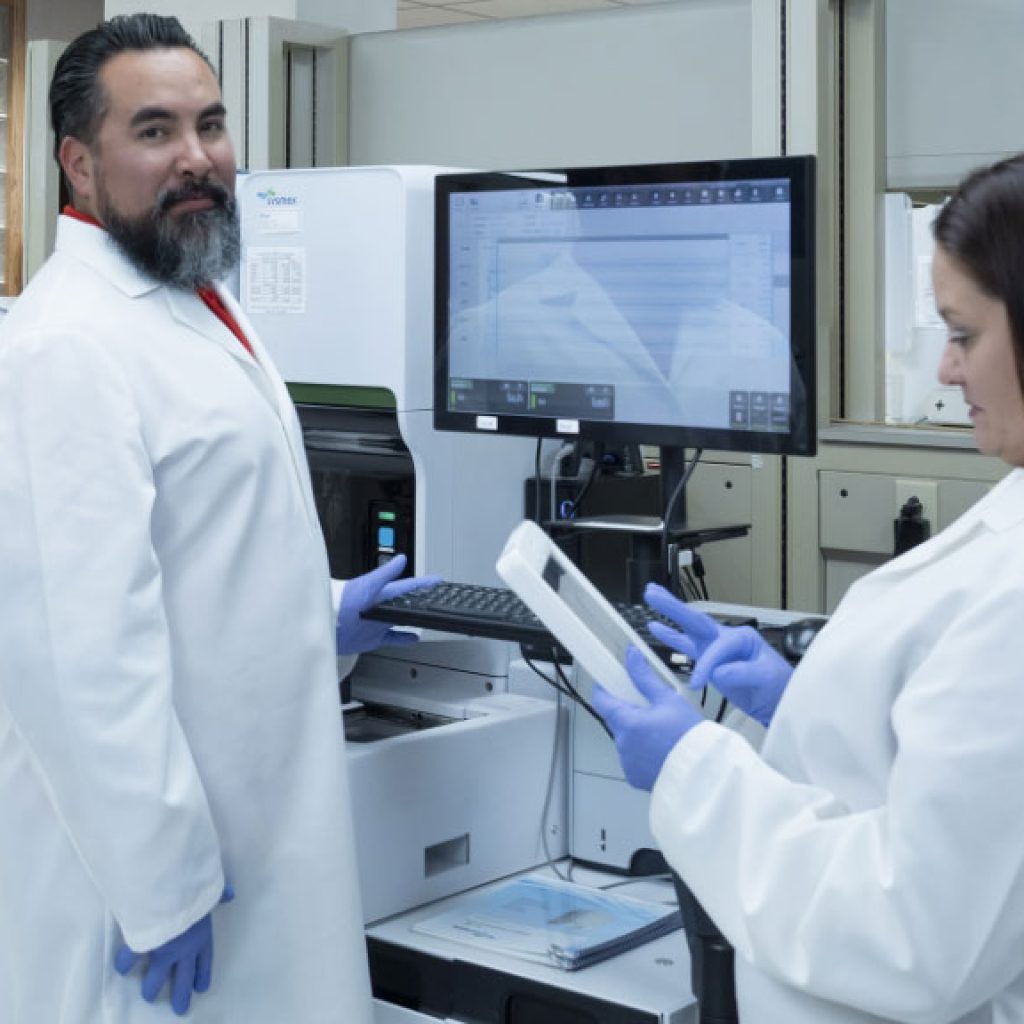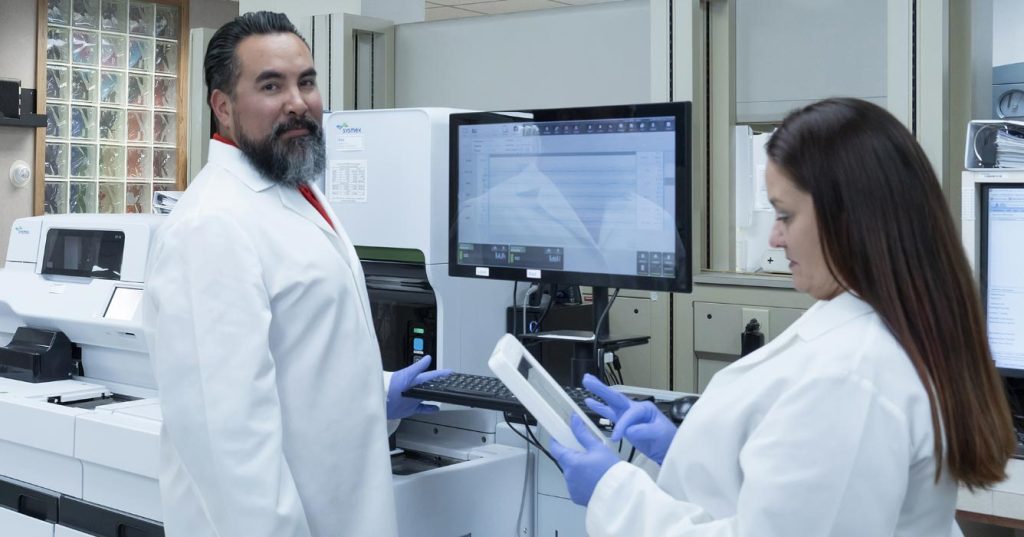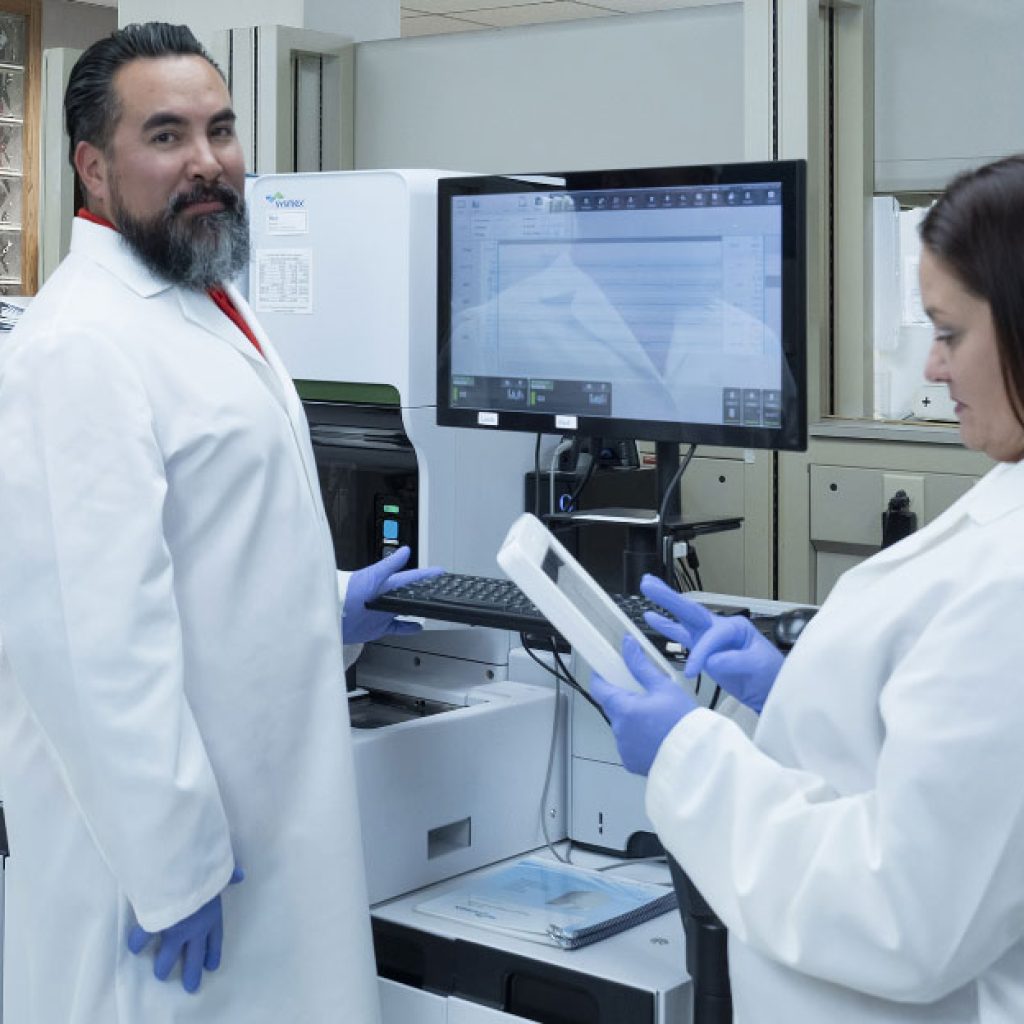LEADING LABORATORY QUALITY
LEADING LABORATORY QUALITY
LEADING LABORATORY QUALITY
Ensuring accurate, safe medical laboratories through accreditation, proficiency testing, and guidelines
Ensuring accurate, safe medical laboratories through accreditation, proficiency testing, and guidelines
Ensuring accurate, safe medical laboratories through accreditation, proficiency testing, and guidelines
CAP Partners with Laboratories to Improve Patient Care
Built on a foundation of pathologist expertise, the CAP partners with laboratories worldwide to help them achieve their quality improvement goals and provide higher standards of patient care while meeting regulatory requirements and improving efficiency. Member expertise from the Council on Scientific Affairs (CSA) and Council on Accreditation (CoA), along with numerous committees reporting to each council, ensures that the CAP’s Laboratory Quality Solution (LQS) portfolio anticipates changes in laboratory medicine and pathology globally.
The CAP’s LQS supported laboratories in more than 115 countries in four key areas:
- Laboratory accreditation programs to improve quality and reduce risk.
- Proficiency testing (PT) to ensure accurate results across all disciplines.
- Protocols and guidelines to improve cancer reporting and clinical decision making.
- Quality improvement tools to improve processes and strengthen staff expertise through technical assessments of competency.
Beginning with the first accredited laboratory outside the US 45 years ago, international laboratories continue to seek global recognition through CAP accreditation. In 2023, the CAP continued to expand its global reach to serve wider patient populations, adding Nepal to its list of countries with an accredited laboratory. Supporting expansion and continuous quality improvement, CAP educational events reached over 6,500 participants in 2023 with topics ranging from high-quality laboratory practices to next generation sequencing based on test validation.
Accreditation Encourages Continuous Improvement
By the end of 2023, CAP-accredited laboratories totaled more than 8,100 worldwide, with more than 700 located outside the US in over 60 countries. These laboratories rely on the CAP’s core Laboratory Accreditation Program (LAP), as well as specialty programs for biorepository, reproductive, and forensic drug testing, to achieve higher standards of quality.
CAP programs provide an engaging, dynamic, and collaborative process that fosters an environment of continuous improvement. The peer-inspection model is built on 7,750 volunteer pathologists and laboratory experts from all over the world. As the COVID pandemic continued to shift in 2023, the CAP leveraged this expansive network of experts to eliminate the backlog of accreditation inspections.
The CAP’s collaborative accreditation process also focuses on improvements to the customer experience, including introducing enhancements to online processes. In June, the CAP launched a new way for accredited laboratories to respond to PT compliance notices (PTCNs) in e-LAB Solutions Suite (ELSS).
The new online response process utilizes intuitive design to enable laboratories to view all performance and non-participation PTCNs online, as well as provide a response and upload supporting documents. Thanks in part to new processes like this one, surveys showed an over 80% customer satisfaction rate.
CAP Partners with Laboratories to Improve Patient Care
Built on a foundation of pathologist expertise, the CAP partners with laboratories worldwide to help them achieve their quality improvement goals and provide higher standards of patient care while meeting regulatory requirements and improving efficiency. Member expertise from the Council on Scientific Affairs (CSA) and Council on Accreditation (CoA), along with numerous committees reporting to each council, ensures that the CAP’s Laboratory Quality Solution (LQS) portfolio anticipates changes in laboratory medicine and pathology globally.
The CAP’s LQS supported laboratories in more than 115 countries in four key areas:
- Laboratory accreditation programs to improve quality and reduce risk.
- Proficiency testing (PT) to ensure accurate results across all disciplines.
- Protocols and guidelines to improve cancer reporting and clinical decision making.
- Quality improvement tools to improve processes and strengthen staff expertise through technical assessments of competency.
Beginning with the first accredited laboratory outside the US 45 years ago, international laboratories continue to seek global recognition through CAP accreditation. In 2023, the CAP continued to expand its global reach to serve wider patient populations, adding Nepal to its list of countries with an accredited laboratory. Supporting expansion and continuous quality improvement, CAP educational events reached over 6,500 participants in 2023 with topics ranging from high-quality laboratory practices to next generation sequencing based on test validation.
Accreditation Encourages Continuous Improvement
By the end of 2023, CAP-accredited laboratories totaled more than 8,100 worldwide, with more than 700 located outside the US in over 60 countries. These laboratories rely on the CAP’s core Laboratory Accreditation Program (LAP), as well as specialty programs for biorepository, reproductive, and forensic drug testing, to achieve higher standards of quality.
CAP programs provide an engaging, dynamic, and collaborative process that fosters an environment of continuous improvement. The peer-inspection model is built on 7,750 volunteer pathologists and laboratory experts from all over the world. As the COVID pandemic continued to shift in 2023, the CAP leveraged this expansive network of experts to eliminate the backlog of accreditation inspections.
The CAP’s collaborative accreditation process also focuses on improvements to the customer experience, including introducing enhancements to online processes. In June, the CAP launched a new way for accredited laboratories to respond to PT compliance notices (PTCNs) in e-LAB Solutions Suite (ELSS).
The new online response process utilizes intuitive design to enable laboratories to view all performance and non-participation PTCNs online, as well as provide a response and upload supporting documents. Thanks in part to new processes like this one, surveys showed an over 80% customer satisfaction rate.
CAP Partners with Laboratories to Improve Patient Care
Built on a foundation of pathologist expertise, the CAP partners with laboratories worldwide to help them achieve their quality improvement goals and provide higher standards of patient care while meeting regulatory requirements and improving efficiency.
Member expertise from the Council on Scientific Affairs (CSA) and Council on Accreditation (CoA), along with numerous committees reporting to each council, ensures that the CAP’s Laboratory Quality Solution (LQS) portfolio anticipates changes in laboratory medicine and pathology globally.
The CAP’s LQS supported laboratories in more than 115 countries in four key areas:
- Laboratory accreditation programs to improve quality and reduce risk.
- Proficiency testing (PT) to ensure accurate results across all disciplines.
- Protocols and guidelines to improve cancer reporting and clinical decision making.
- Quality improvement tools to improve processes and strengthen staff expertise through technical assessments of competency.
Beginning with the first accredited laboratory outside the US 45 years ago, international laboratories continue to seek global recognition through CAP accreditation. In 2023, the CAP continued to expand its global reach to serve wider patient populations, adding Nepal to its list of countries with an accredited laboratory. Supporting expansion and continuous quality improvement, CAP educational events reached over 6,500 participants in 2023 with topics ranging from high-quality laboratory practices to next generation sequencing based on test validation.
Accreditation Encourages Continuous Improvement
By the end of 2023, CAP-accredited laboratories totaled more than 8,100 worldwide, with more than 700 located outside the US in over 60 countries.
These laboratories rely on the CAP’s core Laboratory Accreditation Program (LAP), as well as specialty programs for biorepository, reproductive, and forensic drug testing, to achieve higher standards of quality.
CAP programs provide an engaging, dynamic, and collaborative process that fosters an environment of continuous improvement. The peer-inspection model is built on 7,750 volunteer pathologists and laboratory experts from all over the world. As the COVID pandemic continued to shift in 2023, the CAP leveraged this expansive network of experts to eliminate the backlog of accreditation inspections.
The CAP’s collaborative accreditation process also focuses on improvements to the customer experience, including introducing enhancements to online processes. In June, the CAP launched a new way for accredited laboratories to respond to PT compliance notices (PTCNs) in e-LAB Solutions Suite (ELSS).
The new online response process utilizes intuitive design to enable laboratories to view all performance and non-participation PTCNs online, as well as provide a response and upload supporting documents. Thanks in part to new processes like this one, surveys showed an over 80% customer satisfaction rate.
Checklists Ensure Top Quality and Compliance
The 2023 edition of the LAP checklists was released in August and featured a limited number of changes; the modifications addressed technological advancements while helping to clarify requirements of commonly cited deficiencies and frequently asked questions. With the annual release of the 21 discipline-specific checklists, the CAP continued to serve its laboratory partners and their patients with rigorous requirements confirming regulatory compliance while applying modern best practices in laboratory medicine.
The CAP provides customized checklists to laboratories and inspectors that reflect the tests and non-test activities performed at a given laboratory. The customization helps to reduce time spent on inspection preparation and streamlines the inspection process by allowing laboratories and inspectors to focus their efforts. The CAP continually reviews its process to identify new ways to enhance the experience.
CAP inspection teams, made up of pathologists and other laboratory experts, use the checklists as a tool to monitor laboratory compliance. CAP checklists incorporate required standards from CLIA, the US Food and Drug Administration (FDA), and the Occupational Safety and Health Administration (OSHA), strengthening each laboratory’s ability to deliver high-quality service to ensure the best patient care possible. The CAP is a Centers for Medicare and Medicaid Services (CMS)-approved accreditation organization with deeming authority to inspect laboratories under CLIA.

Checklists Ensure Top Quality and Compliance
The 2023 edition of the LAP checklists was released in August and featured a limited number of changes; the modifications addressed technological advancements while helping to clarify requirements of commonly cited deficiencies and frequently asked questions. With the annual release of the 21 discipline-specific checklists, the CAP continued to serve its laboratory partners and their patients with rigorous requirements confirming regulatory compliance while applying modern best practices in laboratory medicine.

The CAP provides customized checklists to laboratories and inspectors that reflect the tests and non-test activities performed at a given laboratory. The customization helps to reduce time spent on inspection preparation and streamlines the inspection process by allowing laboratories and inspectors to focus their efforts. The CAP continually reviews its process to identify new ways to enhance the experience.
CAP inspection teams, made up of pathologists and other laboratory experts, use the checklists as a tool to monitor laboratory compliance. CAP checklists incorporate required standards from CLIA, the US Food and Drug Administration (FDA), and the Occupational Safety and Health Administration (OSHA), strengthening each laboratory’s ability to deliver high-quality service to ensure the best patient care possible. The CAP is a Centers for Medicare and Medicaid Services (CMS)-approved accreditation organization with deeming authority to inspect laboratories under CLIA.
Checklists Ensure Top Quality and Compliance
The 2023 edition of the LAP checklists was released in August and featured a limited number of changes; the modifications addressed technological advancements while helping to clarify requirements of commonly cited deficiencies and frequently asked questions.
With the annual release of the 21 discipline-specific checklists, the CAP continued to serve its laboratory partners and their patients with rigorous requirements confirming regulatory compliance while applying modern best practices in laboratory medicine.

The CAP provides customized checklists to laboratories and inspectors that reflect the tests and non-test activities performed at a given laboratory. The customization helps to reduce time spent on inspection preparation and streamlines the inspection process by allowing laboratories and inspectors to focus their efforts. The CAP continually reviews its process to identify new ways to enhance the experience.
CAP inspection teams, made up of pathologists and other laboratory experts, use the checklists as a tool to monitor laboratory compliance. CAP checklists incorporate required standards from CLIA, the US Food and Drug Administration (FDA), and the Occupational Safety and Health Administration (OSHA), strengthening each laboratory’s ability to deliver high-quality service to ensure the best patient care possible. The CAP is a Centers for Medicare and Medicaid Services (CMS)-approved accreditation organization with deeming authority to inspect laboratories under CLIA.
CAP 15189 Transitions to Comply with New Standards
Complementing the Laboratory Accreditation Program, the CAP 15189 program covers the ISO 15189 international quality standard for medical laboratories. It includes the ISO 15189’s process orientation and management of systems—which help laboratories to probe deeper into systemic issues, root cause, and risk management—and ways to improve operational agility and efficiency. Over the past two years, the CAP 15189 program grew by 19% in US and overseas markets. Growth was primarily in the biopharma, genomics, and precision medicine global market and was driven in part by the European Union In Vitro Diagnostic Medical Device Regulation directives.
Throughout 2023, the CAP worked to update the Quality Management Education series for an early 2024 release, to align to the new requirements and support customers with clear guidance on CAP15189.
CAP 15189 Transitions to Comply with New Standards
Complementing the Laboratory Accreditation Program, the CAP 15189 program covers the ISO 15189 international quality standard for medical laboratories. It includes the ISO 15189’s process orientation and management of systems—which help laboratories to probe deeper into systemic issues, root cause, and risk management—and ways to improve operational agility and efficiency. Over the past two years, the CAP 15189 program grew by 19% in US and overseas markets. Growth was primarily in the biopharma, genomics, and precision medicine global market and was driven in part by the European Union In Vitro Diagnostic Medical Device Regulation directives.
Throughout 2023, the CAP worked to update the Quality Management Education series for an early 2024 release, to align to the new requirements and support customers with clear guidance on CAP15189.
CAP 15189 Transitions to Comply with New Standards
Complementing the Laboratory Accreditation Program, the CAP 15189 program covers the ISO 15189 international quality standard for medical laboratories.
It includes the ISO 15189’s process orientation and management of systems—which help laboratories to probe deeper into systemic issues, root cause, and risk management—and ways to improve operational agility and efficiency. Over the past two years, the CAP 15189 program grew by 19% in US and overseas markets. Growth was primarily in the biopharma, genomics, and precision medicine global market and was driven in part by the European Union In Vitro Diagnostic Medical Device Regulation directives.
Throughout 2023, the CAP worked to update the Quality Management Education series for an early 2024 release, to align to the new requirements and support customers with clear guidance on CAP15189.
New PT Programs, Resources Meet Laboratory Needs
More than 23,000 laboratories around the world count on CAP PT for providing high-quality and accurate patient testing. In 2023, the CAP launched 13 new PT and education programs covering the following disciplines:
- Anatomic Pathology
- Blood Gas, Critical Care and Oximetry
- Calibration Verification/Linearity
- Coagulation
- Cytogenetics
- Genetics and Molecular Pathology
- Hematology
- Microbiology
- Quality Cross Check
- Quality Management
- Transfusion Medicine
With emerging viruses and diseases impacting patient populations around the world, the CAP continued to innovate and support laboratories with PT specifically for Mpox, SARS-CoV-2, and Zika.
The CAP began offering a PT Participant Summary and Evaluation resource to help program participants get the most out of their PT/EQA data, frequently asked questions pertaining to performance and interpretation of CAP PT/EQA programs (featuring questions categorized by discipline), as well as a troubleshooting guide to learn how to identify trends and perform corrective actions. The easiest and effective implementation of PT means that laboratories will have the most effective testing for patients.

New PT Programs, Resources Meet Laboratory Needs
More than 23,000 laboratories around the world count on CAP PT for providing high-quality and accurate patient testing. In 2023, the CAP launched 13 new PT and education programs covering the following disciplines:
- Anatomic Pathology
- Blood Gas, Critical Care and Oximetry
- Calibration Verification/Linearity
- Coagulation
- Cytogenetics
- Genetics and Molecular Pathology
- Hematology
- Microbiology
- Quality Cross Check
- Quality Management
- Transfusion Medicine

With emerging viruses and diseases impacting patient populations around the world, the CAP continued to innovate and support laboratories with PT specifically for Mpox, SARS-CoV-2, and Zika.
The CAP began offering a PT Participant Summary and Evaluation resource to help program participants get the most out of their PT/EQA data, frequently asked questions pertaining to performance and interpretation of CAP PT/EQA programs (featuring questions categorized by discipline), as well as a troubleshooting guide to learn how to identify trends and perform corrective actions. The easiest and effective implementation of PT means that laboratories will have the most effective testing for patients.
New PT Programs, Resources Meet Laboratory Needs
More than 23,000 laboratories around the world count on CAP PT for providing high-quality and accurate patient testing.
In 2023, the CAP launched 13 new PT and education programs covering the following disciplines:
- Anatomic Pathology
- Blood Gas, Critical Care and Oximetry
- Calibration Verification/Linearity
- Coagulation
- Cytogenetics
- Genetics and Molecular Pathology
- Hematology
- Microbiology
- Quality Cross Check
- Quality Management
- Transfusion Medicine

With emerging viruses and diseases impacting patient populations around the world, the CAP continued to innovate and support laboratories with PT specifically for Mpox, SARS-CoV-2, and Zika.
The CAP began offering a PT Participant Summary and Evaluation resource to help program participants get the most out of their PT/EQA data, frequently asked questions pertaining to performance and interpretation of CAP PT/EQA programs (featuring questions categorized by discipline), as well as a troubleshooting guide to learn how to identify trends and perform corrective actions. The easiest and effective implementation of PT means that laboratories will have the most effective testing for patients.
Committees Deliver Scientific Expertise
The CAP’s PT products are developed with input from members of the CSA’s 28 committees. The CSA’s charge is to serve as the CAP’s scientific resource, providing programs to promote excellence in the practice of pathology and laboratory medicine. In 2023, CSA committees published evidence-based resources to guide the clinical community in emerging areas of pathology and laboratory medicine.
In response to outreach from members regarding the Dobbs v Jackson Supreme Court decision’s potential impact on the practice of pathology, the CAP created an aid for pathologists on the processing and reporting of pregnancy tissues/products of conception specimens. This aid conveys general guidance on the issues that pathologists may face but does not convey legal advice.
CAP councils and committees regularly contribute to studies in Archives of Pathology & Laboratory Medicine. In 2023, Archives published “SPOT/Dx Pilot Reanalysis and College of American Pathologists Proficiency Testing for KRAS and NRAS Demonstrate Excellent Laboratory Performance.” The study shows that molecular next-generation sequencing (NGS) testing laboratories using CAP PT programs exhibited excellent testing performance based on a recent reanalysis of the Sustainable Predictive Oncology Therapeutics and Diagnostics (SPOT/Dx) quality assurance pilot study. This reanalysis indicated that patients undergoing molecular NGS testing at laboratories using CAP PT can be confident that their test results are accurate.
Updated Guidelines Support Patient Care
In 2023, the CAP’s Pathology and Laboratory Quality Center for Evidence-Based Guidelines (the Center) led an update of a high-quality clinical practice guideline for pathologists and laboratories with the release of one reaffirmed evidence-based guideline.
Continuing to improve patient care, the Center, in collaboration with the American Society of Clinical Oncology, reaffirmed the Human Epidermal Growth Factor Receptor 2 (HER2) Breast Cancer Testing Guidelines, reducing confusion over terminology for reporting HER2 results.
The recent clinical trial for metastatic breast cancer patients (DESTINY-Breast04) found that a treatment traditionally used for “HER2 positive” patients was also effective in patients considered “HER2 negative.” As a result of this trial, pathologists were uncertain if new reporting categories, such as a “HER2 Low” category, were needed to identify patients eligible for this treatment.

The CAP’s Center is committed to continually improving the quality of diagnostic medicine and patient outcomes that help pathologists and other medical professionals make informed decisions while emphasizing pathologists’ role in patient care.
After reviewing results of the DESTINY-Breast04 trial and other studies, the CAP/ASCO panel determined that the current HER2 testing recommendations remain valid to identify all breast cancer patients who might benefit from the full spectrum of HER2 related therapies.
The Center released one more updated guideline in late December. “Principles of Analytic Validation of Immunohistochemical Assays” was originally published in 2014. The purpose of the 2023 update was to assess evidence published since the release of the original guideline to provide recommendations on how to analytically validate/verify immunohistochemical (IHC) assays used for diagnostic and predictive purposes.
The Center is committed to continually improving the quality of diagnostic medicine and patient outcomes that help pathologists and other medical professionals make informed decisions while emphasizing the pathologists’ role in patient care.
Pathology Innovation and Informatics Focuses on Strategy
With 2023 marking the Council on Informatics and Pathology Innovation’s (CIPI) first full year, its members met to identify and recommend strategic direction on current and emerging medical information science, data science, and computational technologies that could impact the practice of pathology. The council also provides informatics domain information and expertise to the CAP in furtherance of its programs and mission.
CIPI also engaged with regulatory stakeholders including the Food and Drug Administration (FDA). In 2023, the FDA extended a Broad Agency Announcement (BAA) contract with the CAP to advance design of a coding quality assurance program under the direction of CIPI’s Informatics Committee. Following the agency’s $1 million contract in 2022 for first-year design efforts, the FDA extended the CAP’s BAA contract in 2023 to include $2.5 million for a second-year proof of concept. This proof will demonstrate the CAP’s ability to receive standards-based encoded laboratory test results and evaluate the proper coding of the results. The second year of the contract includes two additional objectives related to creating educational materials for laboratories for proper test encoding and an evaluation of Analysis Normal Form and its applicability to laboratory data.
Committees Deliver Scientific Expertise
The CAP’s PT products are developed with input from members of the CSA’s 28 committees. The CSA’s charge is to serve as the CAP’s scientific resource, providing programs to promote excellence in the practice of pathology and laboratory medicine. In 2023, CSA committees published evidence-based resources to guide the clinical community in emerging areas of pathology and laboratory medicine.
In response to outreach from members regarding the Dobbs v Jackson Supreme Court decision’s potential impact on the practice of pathology, the CAP created an aid for pathologists on the processing and reporting of pregnancy tissues/products of conception specimens. This aid conveys general guidance on the issues that pathologists may face but does not convey legal advice.

CAP councils and committees regularly contribute to studies in Archives of Pathology & Laboratory Medicine. In 2023, Archives published “SPOT/Dx Pilot Reanalysis and College of American Pathologists Proficiency Testing for KRAS and NRAS Demonstrate Excellent Laboratory Performance.” The study shows that molecular next-generation sequencing (NGS) testing laboratories using CAP PT programs exhibited excellent testing performance based on a recent reanalysis of the Sustainable Predictive Oncology Therapeutics and Diagnostics (SPOT/Dx) quality assurance pilot study. This reanalysis indicated that patients undergoing molecular NGS testing at laboratories using CAP PT can be confident that their test results are accurate.
Updated Guidelines Support Patient Care
In 2023, the CAP’s Pathology and Laboratory Quality Center for Evidence-Based Guidelines (the Center) led an update of a high-quality clinical practice guideline for pathologists and laboratories with the release of one reaffirmed evidence-based guideline.
Continuing to improve patient care, the Center, in collaboration with the American Society of Clinical Oncology, reaffirmed the Human Epidermal Growth Factor Receptor 2 (HER2) Breast Cancer Testing Guidelines, reducing confusion over terminology for reporting HER2 results.
The recent clinical trial for metastatic breast cancer patients (DESTINY-Breast04) found that a treatment traditionally used for “HER2 positive” patients was also effective in patients considered “HER2 negative.” As a result of this trial, pathologists were uncertain if new reporting categories, such as a “HER2 Low” category, were needed to identify patients eligible for this treatment.
The CAP’s Center is committed to continually improving the quality of diagnostic medicine and patient outcomes that help pathologists and other medical professionals make informed decisions while emphasizing pathologists’ role in patient care.
After reviewing results of the DESTINY-Breast04 trial and other studies, the CAP/ASCO panel determined that the current HER2 testing recommendations remain valid to identify all breast cancer patients who might benefit from the full spectrum of HER2 related therapies.
The Center released one more updated guideline in late December. “Principles of Analytic Validation of Immunohistochemical Assays” was originally published in 2014. The purpose of the 2023 update was to assess evidence published since the release of the original guideline to provide recommendations on how to analytically validate/verify immunohistochemical (IHC) assays used for diagnostic and predictive purposes.
The Center is committed to continually improving the quality of diagnostic medicine and patient outcomes that help pathologists and other medical professionals make informed decisions while emphasizing the pathologists’ role in patient care.
Pathology Innovation and Informatics Focuses on Strategy
With 2023 marking the Council on Informatics and Pathology Innovation’s (CIPI) first full year, its members met to identify and recommend strategic direction on current and emerging medical information science, data science, and computational technologies that could impact the practice of pathology. The council also provides informatics domain information and expertise to the CAP in furtherance of its programs and mission.
CIPI also engaged with regulatory stakeholders including the Food and Drug Administration (FDA). In 2023, the FDA extended a Broad Agency Announcement (BAA) contract with the CAP to advance design of a coding quality assurance program under the direction of CIPI’s Informatics Committee. Following the agency’s $1 million contract in 2022 for first-year design efforts, the FDA extended the CAP’s BAA contract in 2023 to include $2.5 million for a second-year proof of concept. This proof will demonstrate the CAP’s ability to receive standards-based encoded laboratory test results and evaluate the proper coding of the results. The second year of the contract includes two additional objectives related to creating educational materials for laboratories for proper test encoding and an evaluation of Analysis Normal Form and its applicability to laboratory data.
Committees Deliver Scientific Expertise
The CAP’s PT products are developed with input from members of the 28 committees composing the Council on Scientific Affairs.
The CSA’s charge is to serve as the CAP’s scientific resource, providing programs to promote excellence in the practice of pathology and laboratory medicine. In 2023, CSA committees published evidence-based resources to guide the clinical community in emerging areas of pathology and laboratory medicine.
In response to outreach from members regarding the Dobbs v Jackson Supreme Court decision’s potential impact on the practice of pathology, the CAP created an aid for pathologists on the processing and reporting of pregnancy tissues/products of conception specimens. This aid conveys general guidance on the issues that pathologists may face but does not convey legal advice.

CAP councils and committees regularly contribute to studies in Archives of Pathology & Laboratory Medicine. In 2023, Archives published “SPOT/Dx Pilot Reanalysis and College of American Pathologists Proficiency Testing for KRAS and NRAS Demonstrate Excellent Laboratory Performance.” The study shows that molecular next-generation sequencing (NGS) testing laboratories using CAP PT programs exhibited excellent testing performance based on a recent reanalysis of the Sustainable Predictive Oncology Therapeutics and Diagnostics (SPOT/Dx) quality assurance pilot study. This reanalysis indicated that patients undergoing molecular NGS testing at laboratories using CAP PT can be confident that their test results are accurate.
Updated Guidelines Support Patient Care
In 2023, the CAP’s Pathology and Laboratory Quality Center for Evidence-Based Guidelines (the Center) led an update of a high-quality clinical practice guideline for pathologists and laboratories with the release of one reaffirmed evidence-based guideline.
Continuing to improve patient care, the Center, in collaboration with the American Society of Clinical Oncology, reaffirmed the Human Epidermal Growth Factor Receptor 2 (HER2) Breast Cancer Testing Guidelines, reducing confusion over terminology for reporting HER2 results.
The recent clinical trial for metastatic breast cancer patients (DESTINY-Breast04) found that a treatment traditionally used for “HER2 positive” patients was also effective in patients considered “HER2 negative.” As a result of this trial, pathologists were uncertain if new reporting categories, such as a “HER2 Low” category, were needed to identify patients eligible for this treatment.
After reviewing results of the DESTINY-Breast04 trial and other studies, the CAP/ASCO panel determined that the current HER2 testing recommendations remain valid to identify all breast cancer patients who might benefit from the full spectrum of HER2 related therapies.
The Center released one more updated guideline in late December. “Principles of Analytic Validation of Immunohistochemical Assays” was originally published in 2014. The purpose of the 2023 update was to assess evidence published since the release of the original guideline to provide recommendations on how to analytically validate/verify immunohistochemical (IHC) assays used for diagnostic and predictive purposes.
The Center is committed to continually improving the quality of diagnostic medicine and patient outcomes that help pathologists and other medical professionals make informed decisions while emphasizing the pathologists’ role in patient care.
The CAP’s Center is committed to continually improving the quality of diagnostic medicine and patient outcomes that help pathologists and other medical professionals make informed decisions while emphasizing pathologists’ role in patient care.
Pathology Innovation and Informatics Focuses on Strategy
Twenty twenty-three marked the Council on Informatics and Pathology Innovation’s (CIPI) first full year in existence.
As part of their charge, CIPI members met to identify and recommend strategic direction on current and emerging medical information science, data science, and computational technologies that could impact the practice of pathology. The council also provides informatics domain information and expertise to the CAP in furtherance of its programs and mission.
CIPI also engaged with regulatory stakeholders including the Food and Drug Administration (FDA). In 2023, the FDA extended a Broad Agency Announcement (BAA) contract with the CAP to advance design of a coding quality assurance program under the direction of CIPI’s Informatics Committee. Following the agency’s $1 million contract in 2022 for first-year design efforts, the FDA extended the CAP’s BAA contract in 2023 to include $2.5 million for a second-year proof of concept. This proof will demonstrate the CAP’s ability to receive standards-based encoded laboratory test results and evaluate the proper coding of the results. The second year of the contract includes two additional objectives related to creating educational materials for laboratories for proper test encoding and an evaluation of Analysis Normal Form and its applicability to laboratory data.
CIPI Implements Innovation Across Committees
In addition to the Informatics Committee, CIPI comprises the following committees: Artificial Intelligence (AI), Cancer, Digital and Computational Pathology (DCPC), and Pathology Electronic Reporting (PERT). These committees continue to focus on interoperability and pathology reporting, as well as providing resources and educational opportunities to members and customers looking to implement innovative diagnostic technologies into their laboratories.
The AI Committee developed the CAP policy “Artificial Intelligence in Pathology and Laboratory Medicine,” which was approved by the Board of Governors in summer 2023. This policy addresses the deployment, use, and oversight of AI tools in pathology and laboratory medicine. Furthermore, the committee continued to evaluate the current and future needs of pathologists with respect to AI by developing essential educational materials and best practices for implementation of AI tools.
The Digital and Computational Pathology Committee hosted webinars for over 1,000 registrants on topics ranging from digital pathology CPT codes to digital pathology implementation and ex vivo digital microscopy. The team also partnered with the CAP Personalized Health Care Committee to release a podcast on machine learning AI and precision medicine. The Histology Quality Improvement Program on whole slide imaging continued to grow, with 65 laboratories participating in 2023, an increase of 158% compared to 2022.
CIPI Implements Innovation Across Committees
In addition to the Informatics Committee, CIPI comprises the following committees: Artificial Intelligence (AI), Cancer, Digital and Computational Pathology (DCPC), and Pathology Electronic Reporting (PERT). These committees continue to focus on interoperability and pathology reporting, as well as providing resources and educational opportunities to members and customers looking to implement innovative diagnostic technologies into their laboratories.
The AI Committee developed the CAP policy “Artificial Intelligence in Pathology and Laboratory Medicine,” which was approved by the Board of Governors in summer 2023. This policy addresses the deployment, use, and oversight of AI tools in pathology and laboratory medicine. Furthermore, the committee continued to evaluate the current and future needs of pathologists with respect to AI by developing essential educational materials and best practices for implementation of AI tools.
The Digital and Computational Pathology Committee hosted webinars for over 1,000 registrants on topics ranging from digital pathology CPT codes to digital pathology implementation and ex vivo digital microscopy. The team also partnered with the CAP Personalized Health Care Committee to release a podcast on machine learning AI and precision medicine. The Histology Quality Improvement Program on whole slide imaging continued to grow, with 65 laboratories participating in 2023, an increase of 158% compared to 2022.
CIPI Implements Innovation Across Committees
In addition to the Informatics Committee, CIPI comprises the following committees: Artificial Intelligence (AI), Cancer, Digital and Computational Pathology (DCPC), and Pathology Electronic Reporting (PERT).
These committees continue to focus on interoperability and pathology reporting, as well as providing resources and educational opportunities to members and customers looking to implement innovative diagnostic technologies into their laboratories.
The AI Committee developed the CAP policy “Artificial Intelligence in Pathology and Laboratory Medicine,” which was approved by the Board of Governors in summer 2023. This policy addresses the deployment, use, and oversight of AI tools in pathology and laboratory medicine. Furthermore, the committee continued to evaluate the current and future needs of pathologists with respect to AI by developing essential educational materials and best practices for implementation of AI tools.
The Digital and Computational Pathology Committee hosted webinars for over 1,000 registrants on topics ranging from digital pathology CPT codes to digital pathology implementation and ex vivo digital microscopy. The team also partnered with the CAP Personalized Health Care Committee to release a podcast on machine learning AI and precision medicine. The Histology Quality Improvement Program on whole slide imaging continued to grow, with 65 laboratories participating in 2023, an increase of 158% compared to 2022.
CAP Develops 7 New Cancer Protocols
In 2023, the CAP released seven new and 59 revised cancer protocols. The seven new protocols included three new hematology cancer protocols on lymphoid precursor, bone marrow and plasma cell, two new melanoma cancer protocols, and two new autopsy reporting protocols. Twelve pediatric resection and biopsy protocols were updated to reflect current WHO guidelines; these protocols are now required for CAP accreditation. The addition of this requirement will help improve the care and treatment of pediatric patients with cancer.
Synoptic reporting using the CAP electronic Cancer Protocols (eCP) continues to help laboratories and hospitals comply with requirements for organizations like the American College of Surgeons Commission on Cancer, the CAP Laboratory Accreditation Program, and more. The eCP had over 8,000 licensed users at the end of 2023.
CAP Develops 7 New Cancer Protocols
In 2023, the CAP released seven new and 59 revised cancer protocols. The seven new protocols included three new hematology cancer protocols on lymphoid precursor, bone marrow and plasma cell, two new melanoma cancer protocols, and two new autopsy reporting protocols. Twelve pediatric resection and biopsy protocols were updated to reflect current WHO guidelines; these protocols are now required for CAP accreditation. The addition of this requirement will help improve the care and treatment of pediatric patients with cancer.
Synoptic reporting using the CAP electronic Cancer Protocols (eCP) continues to help laboratories and hospitals comply with requirements for organizations like the American College of Surgeons Commission on Cancer, the CAP Laboratory Accreditation Program, and more. The eCP had over 8,000 licensed users at the end of 2023.
CAP Develops 7 New Cancer Protocols
In 2023, the CAP released seven new and 59 revised cancer protocols.
The seven new protocols included three new hematology cancer protocols on lymphoid precursor, bone marrow and plasma cell, two new melanoma cancer protocols, and two new autopsy reporting protocols. Twelve pediatric resection and biopsy protocols were updated to reflect current WHO guidelines; these protocols are now required for CAP accreditation. The addition of this requirement will help improve the care and treatment of pediatric patients with cancer.
Synoptic reporting using the CAP electronic Cancer Protocols (eCP) continues to help laboratories and hospitals comply with requirements for organizations like the American College of Surgeons Commission on Cancer, the CAP Laboratory Accreditation Program, and more. The eCP had over 8,000 licensed users at the end of 2023.
PERT Hosts Future of Cancer Data Summit
The inaugural Future of Cancer Data Summit, held on October 6 in Chicago, focused on how pathology reporting impacts patient care through data, allowing more personalized treatment. Featuring leading pathologists, informaticians, clinical experts, and patient advocates, the event explored how digital and technological advances, combined with growth in clinical and research applications, continue to enrich pathology data.
LIVING OUR QUALITY MISSION
23,349
laboratories using
CAP PT
1,436
pathologists participating
in on-site inspections
8,104
CAP-accredited laboratories
PERT Hosts Future of Cancer Data Summit
The inaugural Future of Cancer Data Summit, held on October 6 in Chicago, focused on how pathology reporting impacts patient care through data, allowing more personalized treatment. Featuring leading pathologists, informaticians, clinical experts, and patient advocates, the event explored how digital and technological advances, combined with growth in clinical and research applications, continue to enrich pathology data.
LIVING OUR QUALITY MISSION
23,349
Laboratories using CAP PT
1,436
Pathologists participating in on-site inspections
8,104
CAP-accredited laboratories
PERT Hosts Future of Cancer Data Summit
The inaugural Future of Cancer Data Summit, held on October 6 in Chicago, focused on how pathology reporting impacts patient care through data, allowing more personalized treatment.
Featuring leading pathologists, informaticians, clinical experts, and patient advocates, the event explored how digital and technological advances, combined with growth in clinical and research applications, continue to enrich pathology data.
LIVING OUR QUALITY MISSION
23,349
Laboratories using CAP PT
1,436
Pathologists participating in on-site inspections
8,104
CAP-accredited laboratories